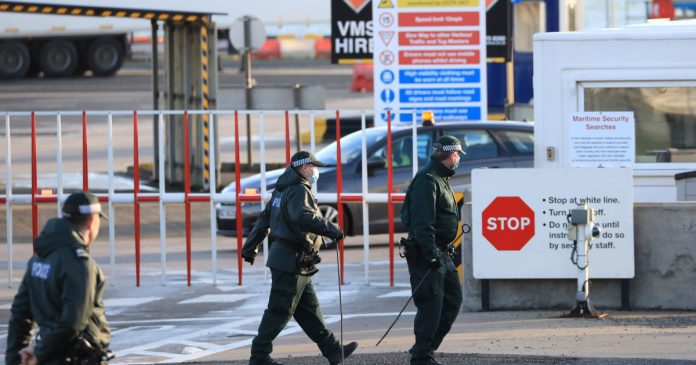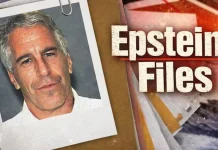[ad_1]
Staff carrying out post-Brexit checks at Northern Irish ports have been intimidated amid rising tensions in the region in the wake of the United Kingdom’s departure from the European Union, a development Irish Prime Minister Micheal Martin has condemned as “sinister”.
The issue prompted the EU on Tuesday to temporarily withdraw its staff deployed in Northern Ireland to oversee the checks, while local officials were pulled out on Monday – meaning checks were suspended at the Belfast and Larne ports.
Many pro-British unionists fiercely oppose the new trade barriers introduced between Northern Ireland and the rest of the United Kingdom as part of the Northern Ireland protocol – a standalone deal for the region which came into effect after the UK left the EU.
Graffiti in Northern Ireland opposing the so-called Irish Sea border effectively created by the protocol referred to port employees as “targets”. Staff have also reported suspicious activity, including apparent attempts to gather their personal information, such as car registration numbers.
“I would condemn the intimidatory tactics against workers,” Martin told reporters. “It’s a very sinister and ugly development and obviously we will be doing everything we possibly can to assist and defuse the situation.”
The EU’s executive arm condemned the “threat of violence” while confirming the bloc’s staff in Northern Ireland had been told to stay away from work.
“We understand decisions taken by the NI authorities to temporarily suspend a certain number of checks for the transfer of goods, it is obvious for us the first and utmost priority is the safety of people,” said European Commission spokesman Eric Mamer, adding the EU would monitor the situation and adapt accordingly.
His comments came after Northern Ireland’s devolved government temporarily suspended some inspections at the ports of Larne and Belfast late on Monday “in the interests of the wellbeing of staff”. A local council had earlier withdrawn staff over safety concerns.
Police in the region said they would increase patrols.
A spokesman for British Prime Minister Boris Johnson said the safety of staff working at ports in Northern Ireland was a priority.
“We are working closely with the [Northern Irish police service] to better understand the situation,” the spokesman said, adding that document checks and assessments of live animals continued to take place.
Politicians from all parties in Northern Ireland’s power-sharing government condemned the intimidation of port workers.
In a joint statement, they said: “There is no place in society for intimidation and threats against anyone going to their place of work.”
‘Seeds of division’
The Northern Ireland protocol was designed to maintain the principles of the 1998 Good Friday Agreement – which ended decades of violence in the region, and prevent the return of a hard border on the island of Ireland.
In effect, it keeps Northern Ireland’s open border with Ireland by ensuring the region stays in the UK’s customs territory but is also aligned with the EU’s single market for goods. That means checks must be carried out on trade between Northern Ireland and the rest of the UK.
But in practice, the protocol has led to delays and in some cases, the trade of some everyday goods originating in Britain has ceased.
While Irish nationalist parties broadly support the Brexit deal’s arrangements for Northern Ireland, Unionist parties see the UK-EU agreement as part of the problem.
Ian Paisley, a politician from the Democratic Unionist Party, said the new trade arrangements had upset “the delicate community balance which exists here”.
“Those who thought they could impose something against the will of every unionist are now reaping the seeds of division they have sown,” he said.
The sensitivity of Northern Ireland’s status was underscored last week when the EU threatened to ban shipments of coronavirus vaccines to Northern Ireland as part of moves to shore up the bloc’s supply.
That would have drawn a hard border on the island of Ireland – exactly the scenario the Brexit deal was crafted to avoid. UK and Irish politicians all expressed alarm at the plan, and the EU dropped the idea.
Responding to the criticism, EU Commission spokesman Mamer on Tuesday said the intimidation originated before the furore over the emergency powers and that “whatever the reason, a threat of violence is simply unacceptable”.
He said senior politicians from the UK and the bloc would discuss the ports situation on Wednesday.
[ad_2]
Source link











